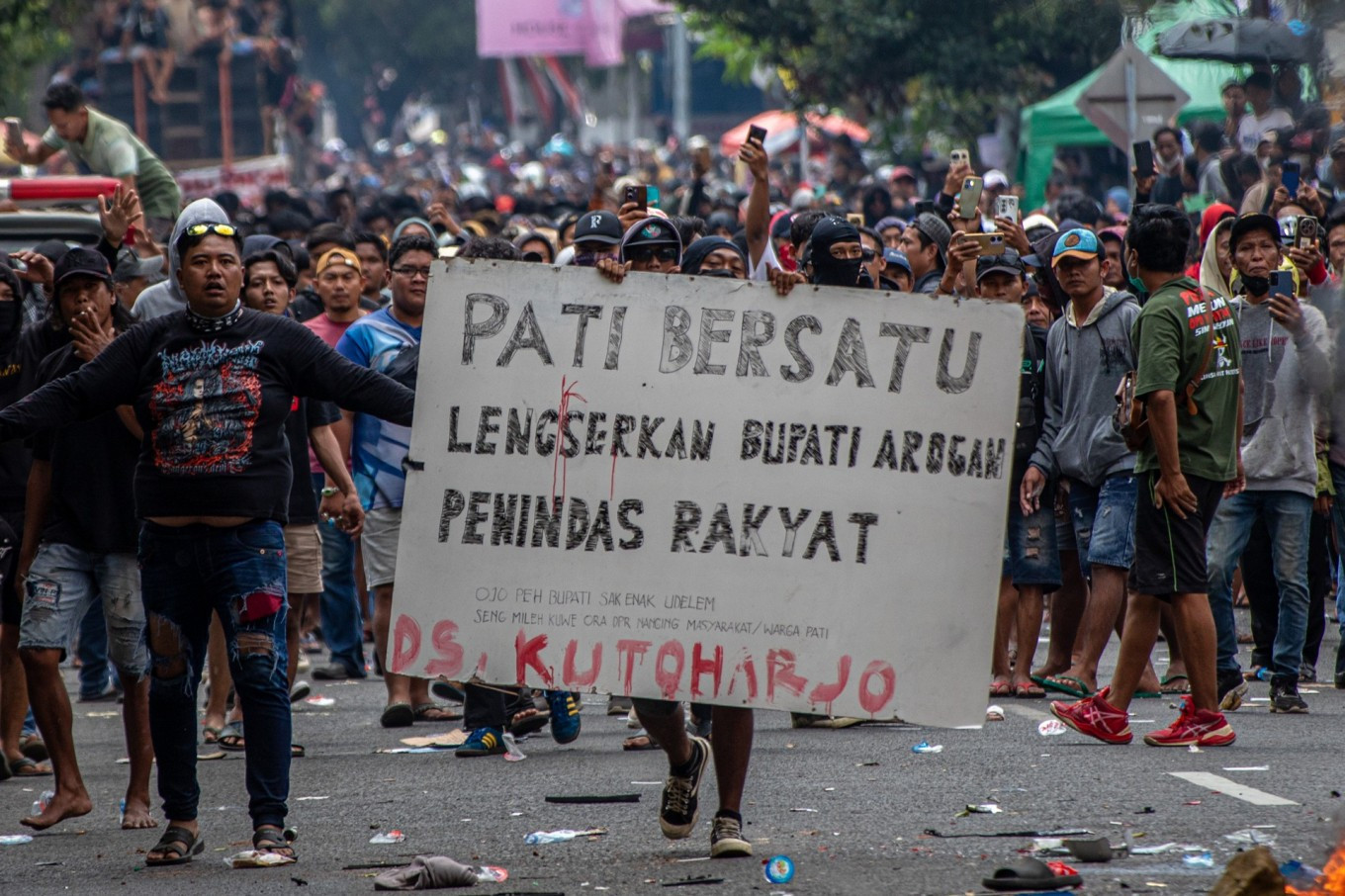News
Pati revolt a real test of Prabowo’s austerity measures
Tenggara Strategics August 25, 2025 A protester holds a sign that reads “Pati united. Down with arrogant regent who oppresses the people“ during a protest in Pati, Central Java on Aug. 13, 2025. (Antara/Aji Styawan) (Antara/Aji Styawan)
A protester holds a sign that reads “Pati united. Down with arrogant regent who oppresses the people“ during a protest in Pati, Central Java on Aug. 13, 2025. (Antara/Aji Styawan) (Antara/Aji Styawan)
Ten months into his term, President Prabowo Subianto ’s trademark austerity measures, designed to conserve funds for flagship programs like the free nutritious meal initiative, have finally collided with local realities.
Over the last few weeks, demonstrations have rocked Pati regency in Central Java after its regent, Sudewo, who hails from Prabowo’s Gerindra Party, announced a steep hike in the region’s building and property taxes (PBB) by up to 250 percent for the rest of 2025. Sudewo claimed that his regency’s administration is currently facing a shortage in funds and pointed to the PBB, which has been untouched since 2011, as a potential source of revenue for the regency’s budget.
Based on data from the Finance Ministry, Pati’s 2025 regional budget (APBD) expects Rp 2.87 trillion (US$180 million) in total revenue, of which Rp 548.51 billion comes from regional own-source revenue (PAD), while the rest relies heavily on transfers from the central government at Rp 2.18 trillion and from other regions at Rp 132.22 billion. As of August, the regency had only been able to realize Rp 1.78 trillion, or 62.3 percent of its target, with Rp 363.02 billion from PAD, Rp 1.34 trillion from central transfers, and Rp 79.84 billion from other transfers.
Needing to ramp up its stream of income rapidly, Sudewo took the instant cash cow approach through his 250 percent tax hike. Coupled with his combative attitude, the proposal was not received well by his constituents and resulted in several demonstrations, which started as calls to reverse his decision but became chants for his impeachment.
Although Sudewo eventually abandoned his proposed tax initiative amid mounting public pressure, the people of Pati continued to mobilize against Sudewo, showing up in numbers with a reported 100,000 protestors rallying against the regent on Aug.13.
At one point in the protest, Sudewo had to be barricaded behind riot shields on top of an armored police car after receiving an onslaught of flip-flop sandals and plastic bottles thrown at him, along with several placards in the crowd held up high with the words “Impeach Sudewo.”
In January, Prabowo issued his first presidential instruction, Inpres No. 1/2025, which ordered cuts to regional transfers of up to Rp 50.6 trillion from the Rp 919.87 trillion previously allocated last year. While meant to allocate state funds for priority programs and fight inefficiencies, the ruling forced regional administrations to make up for the shortfall on their own.
This ruling has now been expanded under the instruction of President Prabowo to the proposed 2026 state budget, which will see regional transfers decrease drastically to their lowest point since 2015 at Rp 650 trillion.
Ill-advised tax hikes and ensuing demonstrations are not reserved only for Pati, as other regions have similarly encountered the same realities in hopes of meeting their end of year financial targets.
In Bone, South Sulawesi, student-led protests erupted after PBB rates were raised by up to 300 percent, sparking clashes outside the regent’s office. While in Jombang, East Java, some taxpayers saw their bills surge by as much as 1,202 percent, prompting symbolic acts of resistance such as paying taxes in coins.
The unpopular tax policies that have trickled down from the President’s efficiency measures reflect a striking reality about Prabowo’s Indonesia. The promise of decentralization carried out during the country’s Reform period continues to be a mirage as regional administrations remain dependent on the central government to supply a large proportion of their budgets to achieve their developmental targets.
As regional influence continues to be crowded out, development programs will ever more shift back toward the central government, achieving Prabowo’s longstanding dream of revitalizing his former father-in-law Soeharto’s New Order.
The President’s top-down approach may then again be noble as the country’s bureaucratic structure is plagued with inefficiency and rampant corruption. However, his unforgiving methods may cause more harm than good as regional administrations come up with demanding measures to meet financial targets that may anger the public.
If Prabowo is not careful in considering how his austerity measures may continue to impinge on the trust and economic realities of the people, the word “impeach” might spread further than just a mere regent.
What we've heard
Three politicians familiar with Gerindra’s internal dynamics said President Prabowo was furious with how Sudewo responded to the anger of Pati residents. Sudewo was accused of tarnishing Gerindra’s image. Nevertheless, Prabowo does not want Sudewo to be impeached. “Sudewo’s case could set off an impeachment scenario that can spread to the national level,” said one Gerindra politician.

